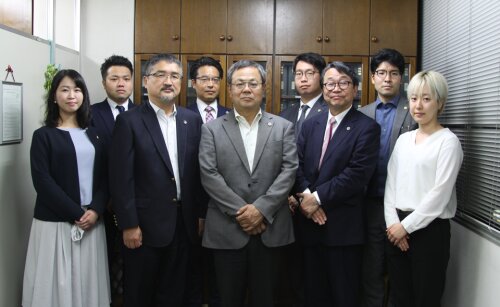Best Marriage Lawyers in Japan
Share your needs with us, get contacted by law firms.
Free. Takes 2 min.
Free Guide to Hiring a Family Lawyer
Or refine your search by selecting a city:
List of the best lawyers in Japan
About Marriage Law in Japan
Marriage in Japan is governed by the Civil Code, which outlines the legal framework for entering, maintaining, and dissolving a marriage. Under Japanese law, marriage is primarily viewed as a family matter, and both parties are expected to adhere to various legal and societal obligations. The marriage must be registered with the local government office for it to be legally recognized. Japan practices a system called "koseki," or family register, which is crucial in relation to marital status.
Why You May Need a Lawyer
Engaging a lawyer can be beneficial in several marital scenarios. Foreign nationals, in particular, may find the legal process complex due to language barriers and differences in legal systems. Legal assistance might be necessary in cases involving prenuptial agreements, international marriages, custody issues, divorce proceedings, inheritance disputes, or protection from domestic violence. A lawyer can help navigate these challenges, ensuring that the rights and interests of all parties are respected under Japanese law.
Local Laws Overview
Key aspects of marriage law in Japan include:
- Age Requirements: Both males and females must be at least 18 to marry, though parental consent is required for those under 20.
- International Marriages: Marriages involving a foreign national require additional documentation, including proof of eligibility to marry. This can be a Certificate of No Impediment or an Affidavit of Competency to Marry.
- Family Register (Koseki): Marriage registration is necessary for legal recognition, with the koseki acting as the main record for marital status.
- Same-Sex Marriage: While not legally recognized, some local governments issue partnership certificates that afford limited rights.
- Divorce: Japan recognizes divorce by mutual consent (kyogi rikon) and judicial divorce, with several grounds such as infidelity or cruelty.
- Custody: Sole custody is generally awarded in divorce cases, with mothers typically receiving custody.
Frequently Asked Questions
What is the process for getting married in Japan?
Couples must register their marriage at a local municipal office. This requires submission of a notification of marriage, identification, and any additional documents for international marriages.
Can foreigners marry in Japan?
Yes, foreigners can marry in Japan as long as they meet the legal requirements. They must prove their ability to marry according to their own country’s laws.
Is same-sex marriage legal in Japan?
No, same-sex marriage is not legally recognized, though some local governments issue partnership certificates with limited rights.
Do I need a prenuptial agreement?
While not required, a prenuptial agreement can help clarify property rights and financial responsibilities, especially in international marriages.
How can I divorce in Japan?
Couples can divorce by mutual consent through a simple registration process or seek judicial divorce for contested cases.
What happens to children after a divorce?
Custody is usually given to one parent, with mothers most often receiving custody. Visitation rights need to be agreed upon or determined by the court.
How are marital assets divided in a divorce?
Assets acquired during the marriage are typically divided equally, though this can be contested in court if needed.
Is domestic violence a legal ground for divorce?
Yes, domestic violence is recognized as a valid reason for seeking a judicial divorce in Japan.
What are the inheritance laws for spouses?
Spouses are entitled to a portion of the estate under Japanese inheritance laws, often sharing with children and other relatives.
Do I need to change my surname after marriage?
Not necessarily, though couples must choose a common surname for practical purposes. Many women traditionally take their husband's surname.
Additional Resources
If you need further detailed information, the following resources can be useful:
- Japanese Ministry of Justice: Offers comprehensive legal information and resources.
- Local Municipal Offices: Provide guidance on marriage registration and document requirements.
- Family Law Specialists: Law firms specializing in international and family law in Japan.
- Japan Legal Support Center: Offers assistance and information on accessing legal resources.
Next Steps
If you are considering legal assistance for a marriage-related matter in Japan, start by consulting a qualified family law attorney with experience in Japanese marriage law. It's beneficial to gather all relevant documents and information beforehand. Reach out to your local municipal office for specific guidance and utilize available resources to understand your legal standing and options fully.
Lawzana helps you find the best lawyers and law firms in Japan through a curated and pre-screened list of qualified legal professionals. Our platform offers rankings and detailed profiles of attorneys and law firms, allowing you to compare based on practice areas, including Marriage, experience, and client feedback.
Each profile includes a description of the firm's areas of practice, client reviews, team members and partners, year of establishment, spoken languages, office locations, contact information, social media presence, and any published articles or resources. Most firms on our platform speak English and are experienced in both local and international legal matters.
Get a quote from top-rated law firms in Japan — quickly, securely, and without unnecessary hassle.
Disclaimer:
The information provided on this page is for general informational purposes only and does not constitute legal advice. While we strive to ensure the accuracy and relevance of the content, legal information may change over time, and interpretations of the law can vary. You should always consult with a qualified legal professional for advice specific to your situation.
We disclaim all liability for actions taken or not taken based on the content of this page. If you believe any information is incorrect or outdated, please contact us, and we will review and update it where appropriate.
Browse marriage law firms by city in Japan
Refine your search by selecting a city.
















